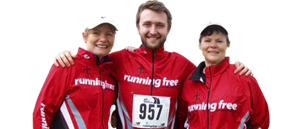BOOK REVIEW
Title: Talent Is Overrated
Author: Geoff Colvin, Senior Editor at Large, Fortune Magazine
Talent Is Overrated caught my eye while my daughter was looking for some magazines for her flight. As much as the book relates to the business world, it is about achieving exceptional performance in any endeavor, running included. So, do you need a special gift to run at the elite level of performance? The answer, you may be shocked to find, is no. And this may just be the motivation you need to take your performance to the next level.
The bad news: You will have to work your butt off to get there, and you will have to go about it smartly. The flip side is those elite runners who we have been admiring enviously have not been bestowed any rare gift from the gods. Rather they have simply put in the work necessary to achieve their present performance level. Example after example of this march to the top is given in the book: from chess players to the Beatles, the necessary due was always paid to achieve extraordinary success.
So how can we begin our own investment? The key to success, which the book clearly identifies, is the concept of “deliberate practice”. To describe what deliberate practice is and is not, can be a bit of a challenge. The book therefore spends a lot of time on examples. And the concept is so universal, that it can be applied to almost anything with a performance element including athletics, music, memory skills, chess and business. With all certainty, deliberate practice is what any top performer has been doing, and what the rest have not been doing. It is always exceptionally mentally exhausting, and in the case of athletics also physically taxing. It is not easy work.
In terms of running, deliberate practice is not the easy warm up. It is not plugging in your I-Pod and going for a 10k jog. In fact, any time you stuff ear buds into your skull to “tune out” you have foregone any opportunity for deliberate practice. Remember, this is what most of us would rather NOT be doing. How about track work? Tempo runs? Hills? Long runs? Hard-to-hold stretches? A six month marathon training plan? All of these are difficult to do and often skipped rather than considered mandatory in our running regimen. They certainly qualify as deliberate practice, and even more so if you are left gasping for life after your last lap on the track.
Deliberate practice is always mentally taxing, but how so? Those of you, who would rather tune out every run with an I-Pod, need to rethink. During deliberate practice, you must tune into to everything going on. Instead of trying to ignore the discomfort and go to a happy place, you are focussing on it and learning just how much more you can handle. You are counting foot strikes and breathing rate, you are constantly evaluating your stride and making corrections for maximum efficiency and forward motion. While your lower brain is saying, “this is all I can give you” your higher brain is issuing overriding commands to go faster; this is an incredible mental fight. This is what elite runners are doing – want to join them?
One thing is certain, you will have to get your affairs in order. One of our own Team Running Free members found out the hard way. The mental stress of starting a new career was simply too much combined with his training regimen (high in deliberate practice and mental effort), and injury found him. This was foremost an overload of the mind before it ever manifested physically! At least that is my new theory after reading Talent Is Overrated, and it makes perfect sense based on how his injury came about.
Talent Is Overrated also identifies several other key elements that compliment deliberate practice. The biggest is the support network. For example, in the case of most child prodigies, this support started early with their parents. And more often than not those parents were reasonably good at what the kid was doing. Think of Tiger Woods and his father Earl. Then, as skills are developed, the support network is expanded through coaching and exposure to other competitors, who will challenge and stretch the performance to higher and higher levels.
For us, the importance of running at least once in a while with others is a great advantage. It can be our version of a support network, where we can receive the equivalent of coaching advice. Further, we can run with and be challenged by those just better than us. This is called stretching, and it is a very specific form of deliberate practice. It is offered three days a week, for free, at Ajax Running Free!
But if you are dead serious about becoming the best, it is time to ante up: get a coach. Most serious runners have one, and if I had the resources, I would get one too. The other aspect to keep in mind is that it will take time to reach the zenith of your performance. In most cases, this will be close to ten years from the time you started taking running seriously. This is called the ten-year rule and it applies to all competitive endeavors. For me, I started running seriously in about 2003 so I can expect to continue improving for at least two more seasons. For those of you just starting out, patience, hard work and perseverance are key. Ten years is a long time, but obviously if you are going to be that dedicated, you will do well.
The book warns of dangers. Most exceptional performers are highly obsessed. These performers often leave a trail of lost friends, family and neglected obligations as they focus and re-focus on their lofty goals. Personally, I have recognized that 100k per week is all my family can endure. And that is I, not them, doing the running. For me, the key to improving is to train smarter with the time I have. My weekly long run is extra long. This means the daily runs can be shorter. And, the other deliberate practice is kept to two days: a tempo run on Tuesday and track on Thursdays. Those two very hard days are done with my running pals at Running Free who often challenge me, and who always make sure I never got off easy.
While I agree entirely that elite runners do not have a special gift of running fast, I feel there is one aspect the book over looks. Deliberate practice is exceptionally hard. The fact that elite runners can endure it therefore means their bodies are capable of absorbing the brutality of hard training and can quickly rebuild after each session. We know the key to a successful marathon is getting to the start line in great shape, not in tatters. Here lies the true gift that we suspect great runners have. But alas, how much of this resilience can be obtained through specific cross-training, weights, stretching and regular physiotherapy? Maybe a lot more than we think and in the end, not so much of a gift after all.
Talent Is Overrated removes our old preconceptions of great performance. Great performance is clearly accessible to all who seek to apply. “Believe It, Achieve It” will be your motivation.
So What About Genetic Gifts? Read: Natural Talent – The Case of Alfie Shrubb




















Well stated Dan.
Funny, some of this stuff sounds eerily familiar. You did forget one thing, though, and that is to never let others tell you what you can and cannot achieve. This includes those around you who think your goals are too lofty. Also, it’s vitally important to understand the motto, “believe it, achieve it”. Because sometimes we let that little hamster in the wheel (aka, our “brain”) limit our own performance. This is why I always have said that you truly do have to believe that what you are striving for is something you CAN achieve. The body will and does follow the brain, always.
I’m almost done my course so we’ll be hitting the bricks soon enough to push each other in some friendly hard training sessions. I’m looking forward to it sir!
Cheers,
Mike
This is an excellant piece. Well written and i enjoyed it throughly. I agree ALMOST entirely. BUT i do believe that certain people are born with a unique physical make up making them more likely to succeed at a certain sport dicipline. Muscle linkage etc. My normal body wieght is 90 kgs thats at 5 feet 10.5 inches, so im a big guy. Its highly unlikely regardless of training i would become an elite marathoner. I did through dicipline and hard work become a very competitive ( ameteur) weight lifter with a 405 bench press at one point.
I do however believe that most of us do not reach our full potential as mentally we dont believe we can achieve greatness.
I have been thinking alot about this particular topic these days and now i will use what i have just read to further push my motivation even further.
See ya on the trails!
Stefan
Dan,well written article,but I would like to add in the genetic factor. A 240 lb man is not going to run a 63 min half-marathon,nor will a 125lb’er play middle-linebacker for the Bears.
Just a thought.
Cheers
Anthony
Most definitely Anthony, not at that weight. But formerly ‘big’ men? You bet. Our Mike is living proof!
Stay tuned for the follow up. A firsthand story of genetically inferior athletes making it to the big time.
Hi Dan. If you liked this book, be sure to read “Bounce” by Matthew Syed.
It is the same premise, but as it relates to the world of athletics…
I was introduced to this concept and the book at the Ontario Sport for Life Conference in November held by the Coaching Association of Ontario.
This is a very common area of interest and is gaining a huge amount of support as a part of Canada’s Long Term Athlete Development model too.
Hi Dan,
I thoroughly enjoyed your piece, and am inspired to now read both Talent is Overrated, and Bounce!
I agree big time that the way a person trains has a lot to do with the outcomes. However, specifically where running is concerned,
WEIGHT is a huge factor. To be a truly fast (elite) runner, no matter what the distance, the lighter you are, the less work you have to do to move
forward efficiently.
Your article is extremely well written – write more!!
Thanks, Jane